A Little "Self"-Reflection With the Cast of Incognito
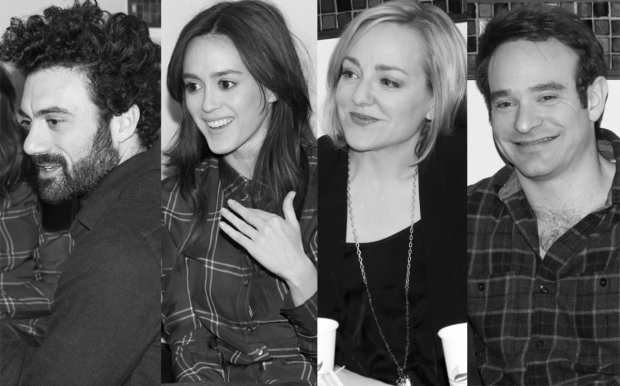
(© David Gordon)
"Imagination is more important than knowledge." The aphorism, attributed to one of the most knowledgeable men in scientific history, Albert Einstein, gets several refrains in Nick Payne's new play Incognito. Both knowledge and imagination get their share of stage time in the neuroscience-centric play, which questions the connection between the brain and the mind — the mind and the "self" — and the "self" and the identities we may or may not choose to assume and shed on a daily basis.
Geneva Carr, Charlie Cox, Heather Lind, and Morgan Spector take on over 20 such identities throughout Payne's freeform play, which is divided into the three appropriately titled sections: "Encoding," "Storing," and "Retrieving." A few of his characters borrow from real-life scenarios, including H.M., a man rendered incapable of forming new memories following a surgical resectioning of his hippocampus; Dr. Thomas Harvey, who stole Einstein's brain for scientific study after performing his autopsy; and Evelyn Einstein, adopted daughter of the mad genius with questionable genetic roots.
Payne, director Doug Hughes, and the cast of the MTC production gathered at New York City Center for a conversation on the big questions these characters bring to the surface, including a few of their own impressions of what makes us tick.
Encoding
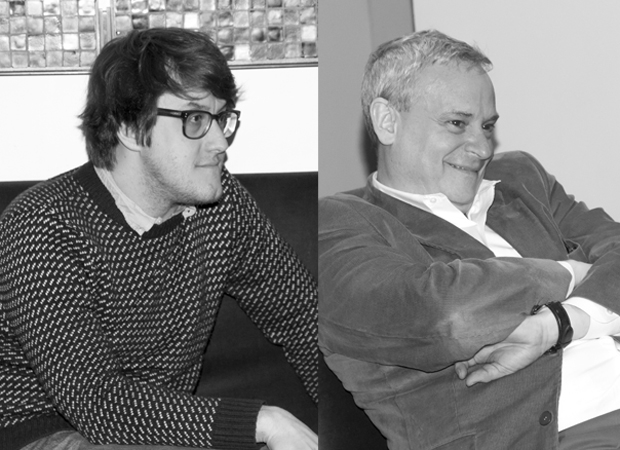
(© David Gordon)
In the play, the brain is described as one big "storytelling machine." Does that idea change the way you see your own jobs as storytellers?
Morgan Spector: I think this play is really ennobling to storytellers of all stripes because if consciousness itself is a story, then stories are literally the substance of our lived experience. The stories that we tell ourselves are basically the most important thing that we do because those stories will inevitably be incorporated into those self-narratives.
Doug Hughes: We make ourselves up as we go along. It might not be the truth but it's all we've got. And it's a group experience — consciousness. In our case four fantastic actors make demonstration of that fact…that it's a joint enterprise.
Nick Payne: I honestly sincerely think this is the only way I could tell this story. It's absolutely not about playing some trick or trying to be clever. You'll spend a moment maybe going, "What the f*ck? How am I going to follow this?" But you will.
Storing
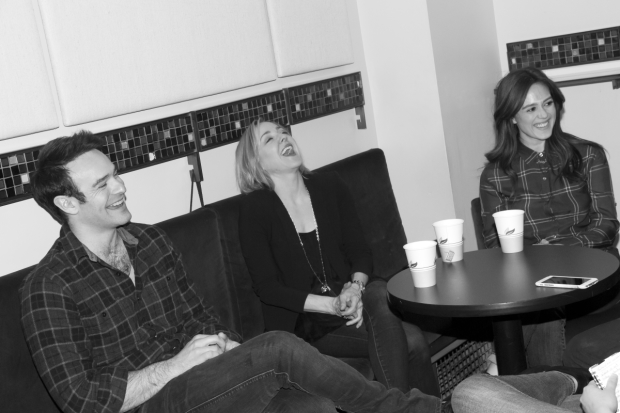
(© David Gordon)
Geneva, your neuropsychologist character, Martha, envies her amnesia patients because they get to feel the freedom of not knowing who they are. Does the play give you all a taste of that feeling as you switch from character to character?
Geneva Carr: It just feels incredibly playful to me. It's like when you're a kid. You just go with it and the other actor is up to play.
Morgan: I think that's really on point because when you're a kid you don't have the burden of much memory. You don't have to make your behavior correspond with the existing narrative because there is no narrative. That's the great thing about being an actor — you get to do that again because what happened prior to the curtain coming up is not relevant.
Does anyone here actually envy the amnesiac experience like Martha?
Heather Lind: No, because for me, regardless of whether your memories and experiences are burdens to you, they're the only things that dictate what to do next. Even if we're burdened by our past, we're on a diving board and at least we can jump off somewhere.
Geneva: But she envies it because she's remaking her life. She's having her midlife crisis and doesn't know who she wants to love. She's failed at a twenty-one-year marriage, it doesn't look like her relationship with her son is perfect. She's talking about getting to figure out who you are without having constraints or responsibilities.
Charlie Cox: In that sentence you said, "figure out who you are." Which is kind of the irony to the whole thing. Because one of the things I think the play is saying is that's not the point. It's not to try and figure out who you are. It's to try and figure out that you don't have to be who you think you are.
Heather: I think the devil's advocate to that is — and I think it's something I've struggled with in this play — no matter how many limitless possibilities there are for who I am, there's always one that feels righter. Even within all the characters I play, when I check back in with myself, I'm always judging them against my own sense of truth. For me, identity is something I've clung to in a way as solace. I think a lot of our lives are spent trying to align ourselves with who we feel we are. And I think there is a search in this play for each of our characters to find themselves, which suggests that there is a self to find.
Retrieving
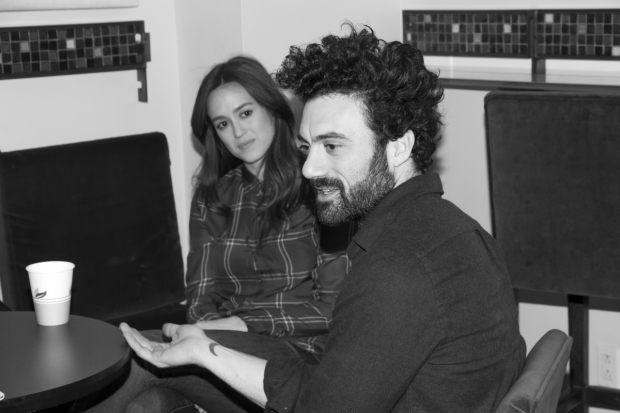
(© David Gordon)
Nick, after writing this play, have you decided whether you think there is such thing as a "self?"
Nick: Well I certainly think it's incredibly fragile. If you ever met someone or had someone in your family who has had some kind of neurodegenerative disease, you see the person go. So I think that is the thing that I'm left with. Otherwise, weirdly, I find it all quite comforting. I'm no one, I could be anyone. We're meaningless in a meaningless universe. [laughs]
Charlie: You hear people all the time describe something that they did and then they back it up by saying, "That's just who I am. I can't change." I fundamentally disagree with [that]. If you're willing to see patterns of behavior and ego, you're given a choice to say, "Maybe I don't have to engage in that." When you play any character, the basic question is, "What does this person want?" But then character is found in tactic: They praise someone, they bully them, they cajole them. That is something that as people we can go in and out of. You can be one person to someone and you can be someone completely different on another day to another person, based on your experiences of that day.
Morgan: Or based on your context. If you're traveling in a foreign country and you don't speak the language and none of the things you usually use to signify your identity to people have any application, who are you?
Geneva: I moved to France young and I got to be a brand-new person. They couldn't make any judgments about me because none of the barometers that were here were the same. It was amazing.
Morgan: When you came back, what happened to that person that you were in France?
Geneva: I don't feel American anymore in the same way. I came back to America and I got to appreciate it almost like a foreigner.
Heather: I think there's a case to be made in this play for the spirit. There is something to do with heart and love that feels slightly outside of the scientific rhetoric.
Nick: I suppose because I'm not a scientist, while I find those views and ideas really fascinating and also sort of liberating, I guess a little bit of me has to believe that there is something else — something other that is mysterious that we can't explain.
Doug: In the end it's really hard to say, "What does it all mean?" But it might be possible to say, "But I found something."
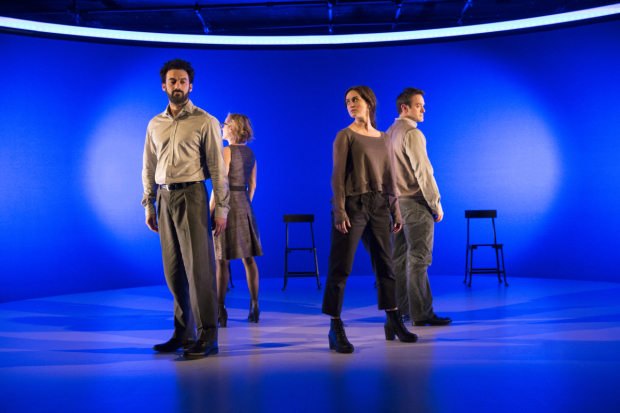
(© Joan Marcus)










